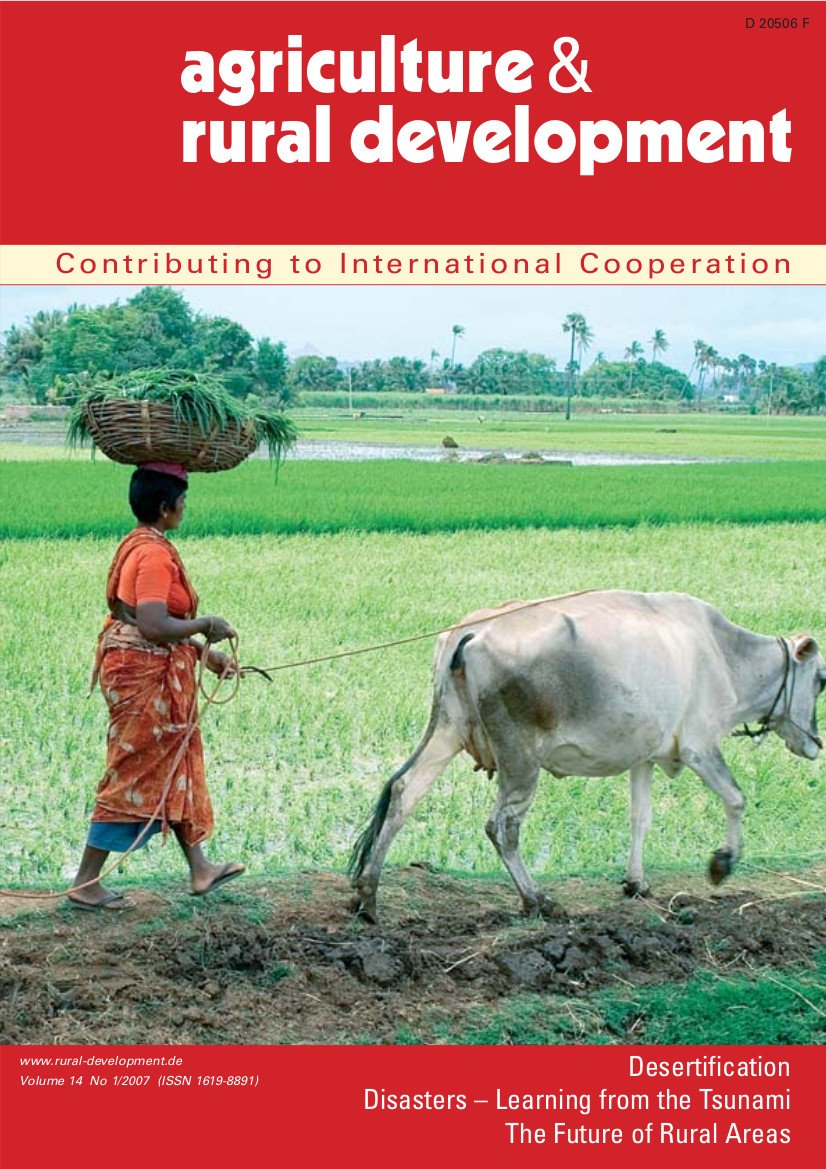Location
The international journal Rural 21 has dedicated more than 40 years to all topics surrounding rural development. Its ambition is to further those strategies and policies that strengthen rural areas of developing and newly industrialising countries and encourage their implementation. The journal addresses the complete range of relevant themes – from agriculture and fisheries via capacity building and education through to health and social security, energy supply and trade. Center-stage is always devoted to inquiring into how measures and strategies can contribute to global food security and to reducing poverty.
Rural 21 desires to further the dialogue between science and politics, the private sector, civil society and practitioners. Two platforms are designed for this purpose: Rural 21 in print is published four times a year, each issue highlighting a specific focus of rural development – this print edition is read in more than 150 countries. In parallel, Rural 21 online keeps the rural development community up to date on news and events, scientific findings and other print and online publications.
Rural 21 is published by DLG-Verlag GmbH in Frankfurt/Germany. Financial partners are BMZ (German Federal Ministry for Economic Cooperation and Development), GIZ (Deutsche Gesellschaft für Internationale Zusammenarbeit), DLG (German Agricultural Society – Deutsche Landwirtschaft-Gesellschaft), SDC (Swiss Agency for Development and Cooperation) and Helvetas Swiss Intercooperation.
The first issue of Rural 21 dates back to 1968. From 1974 to 2007, the journal was published in three languages entitled "entwicklung & ländlicher raum" / "agriculture & rural development" / "agriculture & développement rural". In 2008, the journal was relaunched as "Rural 21".
Members:
Resources
Displaying 291 - 295 of 319
Country Study 3:
Sierra Leone - a state on the move
After ten years of civil war in which grave human rights violations and atrocities were committed, especially against women and children, Sierra Leone was regarded as a «failed state». A massive UN peacekeeping mission managed to demobilize the combatants in 2002 and peace was restored. Public institutions have begun to resume their functions and the economy is showing signs of recovery. Nonetheless, the country's stability and structures are still fragile. So how can development cooperation contribute towards stabilizing Sierra Leone?
Country Study 1:
Afghanistan - A state in upheaval
Until 1978, the Afghan state was weak but stable. In contrast, rural regulatory structures that complemented the state have always been strong. It was only the attempt to establish a strong state on the basis of foreign ideologies and military over the heads of the rural population that ultimately led to chaos and collapse.Whereas the central state sometimes broke down, many state
institutions in the provinces demonstrated remarkable resilience, leading to a definite nation-state consciousness throughout large sections of the population.
Rural areas of the South in the year 2016 - a likely development scenario
The rural areas of the South have undergone vital socio-economic and technological changes marked by globalisation, economic liberalization and political decentralization and by the information and communication sector. Will these changes suffice to improve the living standards of the rural population and lessen the urban-rural gap or will the rural sector remain in isolation and be also in ten years time home of the poor?
The Voluntary Guidelines on the right to food: Commitment to a human rights approach.
The Voluntary Guidelines on the human right to food provide a further instrument of international law in the fight against world hunger.The Guidelines promise to be a powerful new weapon in combating malnutrition.They forge an alliance between development policy and human rights in the struggle for the right to food. The «human rights approach» has become the new watchword in the fight against hunger.
Fragile states from the perspective of rural communities
Fragile states, posing a major challenge of our times, are increasingly becoming a focus of attention in international politics and development cooperation. But very often, the viewpoint of the people affected by fragile statehood is not sufficiently heard. Parts of the international community prioritize their own security policy interests, the motto being the «war on terrorism». People in fragile states, by contrast, are primarily concerned with their own survival and the quest for development opportunities for themselves and their communities.



